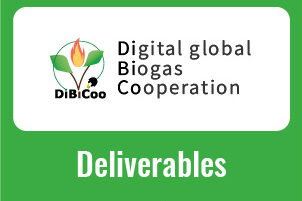As with many EU-funded projects, the Digital global Biogas Cooperation (DiBiCoo) is designed around certain results called ‘Deliverables’. Our partner institutions lead and implement these activities towards the successful execution of the project objectives. Deliverables could include research publications, market studies, factsheets, guidelines, policy recommendations and on the ground implementations among others. DiBiCoo has 45 deliverables grouped in 8 work packages (WP), each focusing on different areas of the project objectives. Broadly speaking, focus areas can be grouped around four pillars.
Importing and Exporting country analysis (WP 2 and 3): one of the objectives of DiBiCoo is facilitating knowledge and technology transfer between the European biogas industry (so called exporting countries) and emerging economies of Argentina, Ethiopia, Ghana, Indonesia & South Africa (importing countries). These work packages are designed to provide a deeper understanding of the biogas sectors in both importing and exporting countries.
Deliverables in WP2 aim to provide information and resources on European biogas technologies; to identify key European stakeholders; to analyze export opportunities from the industry perspective and to compile best practices and lessons on European legal and institutional frameworks.. On the other hand, WP3 focuses on the biogas sectors in Argentina, Ethiopia, Ghana, Indonesia and South African and provides insights on biogas market frameworks and market dynamics, pinpoints key players, and assesses research needs for the adaptation of technologies, as well as available financing opportunities in each country. This is intended to deepen the understanding of the respective biogas markets and their country- specific peculiarities and to inform European technology suppliers in order to customize technology recommendations and to identify potential project and business opportunities.
Capacity Building and Market Uptakes (WP5 and 6): dissemination of technology to less developed biogas markets must be accompanied by capacity building both from a technical and project execution perspective. Work package 5 addresses this through organizing networking events; arranging overseas study tours; conducting technical and management training; and organizing periodic web seminars on various biogas-related topics. Furthermore, WP6 prepares markets for the uptake of biogas technologies primarily through the identification and support of demo cases in each importing country. Eligible developers will receive guidance and assistance through concept development and elaboration of business models, among others.
Matchmaking tool (WP4): all output and information from other work packages become an input for the development of DiBiCoo’s online networking tool, developed under WP4. The objective is to develop a DiBiCoo Online Information and Matchmaking System for convenient networking and matchmaking between actors of exporting and importing markets on biogas technologies. The new platform will facilitate the identification of relevant business partners and thus simplify the initiation of future business partnerships and biogas projects. This will contribute to the further market growth for biogas in Argentina, Ethiopia, Ghana, South Africa and Indonesia.
Project Coordination and Communication (WP1, 7 & 8): these work packages ensure the efficient execution of all other work packages and tasks through coordinating the overall project and consortium and through effectively communicating and disseminating project results at local, regional, national, European and international level;
You can already find completed reports of deliverables on our DiBiCoo website. Look out for more reports to be uploaded on the website soon as they are completed throughout the project´s duration. Reports for each deliverable are submitted to our funding agency, EU’s Horizon 2020 research and innovation program. It is important to note that some could be awaiting approval from the EU. While full access is restricted for confidential deliverables; others are available freely for download.
Deliverable reports are developed by the DiBiCoo consortium, consisting of 13 organizations from Europe, Africa, Asia and South America. As such, these documents are owned by the DiBiCoo consortium and are subject to copyright. Allowance is made for fair usage of these documents with proper referencing. The sole responsibility for the content of these documents lies with the authors. It does not necessarily reflect the opinion of the EU.
